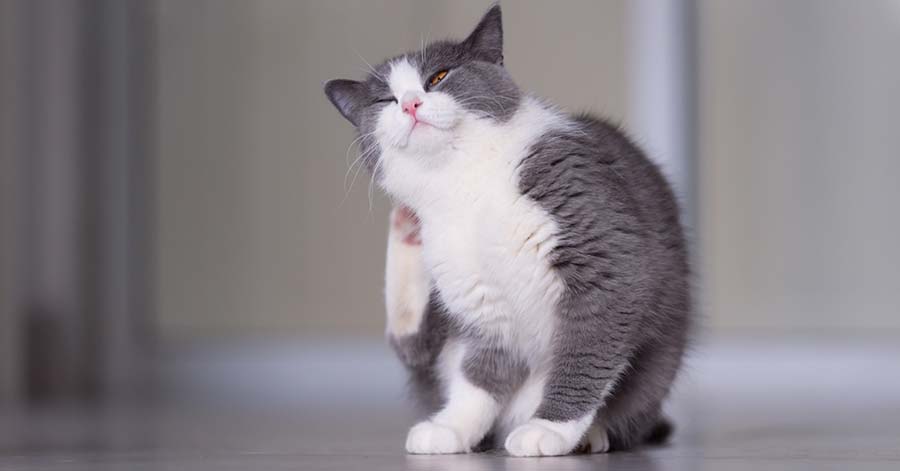The Best Natural
Flea Treatment for Cats

Cats and dogs are like night and day in a lot of ways. This goes for flea treatments as well. While both species get fleas and can be harmed by a flea infestation, a cat’s body system is much more delicate than a dog’s. Even natural flea treatments must be “handled with care” when it comes to your kitty.
A Few Words About Chemical Flea Treatments for Cats
One thing that dogs, cats, and humans have in common is that we can all be adversely affected by chemicals found in commercial flea and tick products. As of 2010, the Environmental Protection Agency (EPA), and to some extent the US Department of Agriculture (USDA), monitors insecticides used in these products. What this means for the most part, however, is that manufacturers are now required to list chemical ingredients and indications on product labels.
New EPA regulations do not do much to curtail the actual use of these chemicals, which research is continuing to link to disease. For example, a recent study conducted by Duke University found that the “synergizing” chemical piperonyl butoxide (PBO), which is used to enhance the effectiveness of over 700 different insecticides, “disrupts a biological signaling system that is critical in neurological development.”
Their report, which was published in the May 2012 edition of Toxicolological Sciences, found that human fetuses (and we can assume developing puppies and kittens as well) are particularly at risk for severe neurological defects when exposed to PBO.1 Many commercial flea and tick products, including Spectra Shield Medallions™ and Ovitrol Plus™, contain PBO.
4 Tips for Natural Cat Flea Treatment
So what is a concerned pet parent to do? First is to understand your kitty’s unique constitution. There are many flea elimination substances and strategies that may work for your dog but not for your cat. Here are some tips to keep your kitty flea-free, healthy, and happy:
#1 – Consider dry baths with diatomaceous earth. Anyone who has ever tried to give their cat a bath (i.e. with actual water) probably has more than a few war wounds to show for it. If your cat has a bad flea infestation, a wet bath using a simple shampoo of bio-degradable dish soap, vinegar, and warm water may be necessary. Dish soap will kill adult fleas on contact and is considered safe for all pets.2
In addition, kittens should be bathed if possible at any sign of flea infestation. Their tiny and still-developing bodies are especially vulnerable to disease spread and parasites that may come from the fleas. If they are under 8 weeks of age, consider a sponge bath with mild soap and warm water. Introducing wet bathing to your little one may also help her accept the procedure as she matures.3
Watch FREE Wednesday, April 4, 2018
Enter your name & email below to register to watch all 7 episodes FREE!
The above scenarios aside, it is perfectly okay and effective to give your cat a natural “dry bath” using diatomaceous earth (DE). DE is a natural substance made up of the fossilized remains of hard-shelled critters called diatoms. These ancient algae-based life forms are crumbled in to a fine powder which can be rubbed into your kitty; make sure you get the food grade variety.
DE is harmless to humans and pets, yet deadly to fleas. DE’s have sharp edges that make tiny slices through flea exoskeletons, eventually causing severe dehydration and death. The main thing to remember is to go sparingly when applying DE to your cat’s skin and to avoid her face. The powder should not be breathed in, so go as slowly and carefully as you can to avoid stirring up much dust. It is important for you to wear a mask when applying as well.
#2 – Try a cat comb. Your cat may be wary at first, but most cats eventually come to love the extra attention that comes with combing. Keep a bowl of soapy water nearby. Dip your fine-toothed flea comb into the bowl after each swipe to kill any captured fleas right away.
If your cat doesn’t mind the smell, you can also make a lemon-water solution to spray as you comb. Lemon deters fleas so the leftover scent will also make them look elsewhere to set up shop. To make lemon water spray, simply put 3 cups of water into a pot along with 3 chopped up lemons. Bring to a boil, let steep for a few hours then strain into a spray bottle.4
Make cat combing a daily practice. Odds are, your cat will look forward to it… eventually.
#3 – Use safe natural products in your flea spray. Dogs have a pretty wide tolerance for essential oils such as clary sage, rosemary, and peppermint which can be incorporated into simple flea sprays for use every day. Cats? Not so much. This is because cats lick their fur – a lot. All the essential oils that would normally stay on a dog’s fur will eventually wind up in a cat’s internal system through their constant licking. Therefore, be sure to do your research before using essential oils on cats.
Keeping it simple is a good way to start out with feline natural flea sprays. Vinegar and water or the above described lemon-water mixture are easy solutions you can spray on your cat every day (if it lets you).
#4 – Keep your home clean and naturally flea-free. Finally, it is important to monitor your home for flea activity and to keep floors, carpets, and furniture well-scrubbed and vacuumed. Add regular cleaning of human and pet areas a part of your weekly routine. You can also sprinkle borax or DE to carpets for a natural flea repellent which will also break the cycle of flea re-population. Just be sure to vacuum up these substances thoroughly before allowing your pet or small children to come back into the room. Borax especially should not come into direct contact with skin since it does contain mild toxicity.5
Finally, remember that fleas also come from outside the home. Instead of using harsh insecticides on landscaping and lawns, why not use nematodes? Nematodes are microorganisms that feed on flea larvae but are completely safe for humans and animals.6 You can mix it in to soil or spray it on outside areas around your home.
While “more is better” may be the mantra of our modern world, this does not apply to cats. These sometimes moody, often wild, and always endearing members of your family are also very sensitive to chemicals, medications, and even natural substances such as essential oils. Always take precautions and be conservative when using any new substance for fleas on your furry friend.
- https://www.ewg.org/news/news-releases/2012/05/31/duke-study-confirms-toxicity-widely-used-pesticide-ingredient#.WqAHHJPwbOS
- http://www.geniuskitchen.com/recipe/natural-dog-shampoo-flea-removal-480112
- https://pets.thenest.com/can-start-bathing-kitten-12087.html
- http://everydayroots.com/flea-remedies-for-cats
- http://www.thebugsquad.com/fleas/borax-fleas/
- https://www.peta.org/issues/companion-animal-issues/companion-animals-factsheets/flea-control-safe-solutions/

